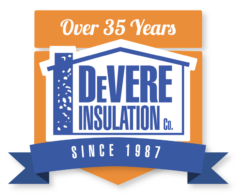Cellulose Insulation Contractor in Baltimore, MD
If you’re looking for a non-fiberglass alternative for your insulation needs, cellulose insulation may be the right choice for you. Made from recycled newspaper, it has gained popularity in the past few decades and is ideal for filling closed walls or adding backup insulation to attics and other spaces in your Baltimore home.
What is Cellulose Insulation?
Cellulose insulation is typically made from recycled newspapers and other waste paper products like cardboard and office paper. While filling your walls with paper products may sound like a risky choice in the event of a fire, cellulose insulation is treated to reduce that risk. The paper that is processed is treated with a fire retardant during the manufacturing process, meaning it won’t actively catch fire if exposed to flame.
Cellulose insulation typically comes as loose-fill insulation. The installation process, therefore, involves using an insulation blower to blow the cellulose insulation in walls or attics, allowing the pieces to settle in and fill the spaces.
When You Should Use Cellulose Insulation
Cellulose insulation can be used similarly to how blown-in fiberglass insulation is used, with the ability to have it blown or dense packed into nearly any space. This makes cellulose insulation ideal for closed walls that need better insulation. Instead of conducting an invasive insulation process that requires opening up the entire wall cavity, cellulose insulation can be blown in through a small hole providing access to the wall cavity. Loose-fill cellulose insulation also provides an effective insulation method for attics, either as primary insulation or as a second layer over aging or poorly installed fiberglass batt insulation. The blown-in cellulose insulation will settle over the attic evenly, filling irregular spaces with ease.
Benefits of Cellulose Insulation
If you are considering cellulose vs fiberglass insulation for your Baltimore home, one of the primary benefits of cellulose insulation is that it fits easily into tight corners and readily fills small gaps. Fiberglass batt insulation is cut to the right size for spaces which can leave small gaps and leaks around the edges of the insulation. Loose-fill cellulose insulation fills in small spaces, creating a full insulating blanket. This helps improve your home’s energy efficiency and cut down on your utility bills.
More to Know About Cellulose Insulation
You may have heard about the growing popularity of cellulose insulation and its many energy saving benefits such as reducing your carbon footprint, lowering your heating and cooling costs, and providing quality sound control. Here are a few more things to know about this effective insulation choice:
- It has a Class 1 flame spread rating and contains active fire-resistance materials to provide durable and excellent fire resistance.
- It is resistant to mold growth and works to dissipate moisture for moisture management.
- It does not contain asbestos or formaldehyde.
- It is ideal for insulating older homes and adding R-value and filling gaps over existing insulation.
- It is safe to touch and won’t irritate unprotected skin.
- It won’t settle in sidewalls but will settle in attics until it reaches a stable density, similar to other blown insulation. All thermal performance testing is done at the settled thickness.
Baltimore’s Expert Cellulose Insulation Installers
When you work with DeVere Insulation for your insulation project, you’re getting the best insulation installers around. Serving the Baltimore, Maryland area’s insulation installer needs since 1987, our company aims to provide a thorough, stress-free insulation process for customers. Our experienced insulation team and insulation installers will work with you through every step of the process, from selecting the appropriate type of insulation for your project to performing expert installation in your home or business.
If you have questions about cellulose attic insulation, such as cellulose insulation cost, or about another type of insulation for your next project, let us know. Our expert team is ready to answer your insulating questions. Call us today at 410-360-6900.
